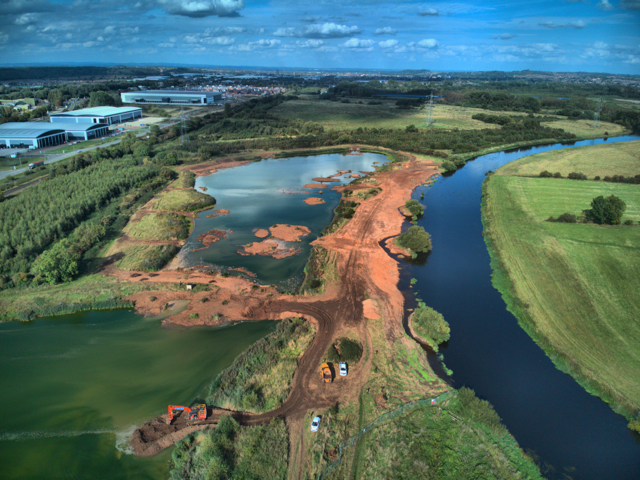
Summary
Victoria Bunter, Senior Living Floodplains Officer, and Louise Morris, TTTV Project Manager, will talk about their work Transforming the Trent Valley. Historically forced into a single channel, the River Trent is being renaturalised through the introduction of natural features, and being reconnected to its floodplain through soft engineering techniques.
A legacy of WWII, small concrete fortifications known affectionately as pillboxes, stand in silent vigil over the River Trent. Created as defensive structures, they are now being reclaimed for nature. Dr Mark Knight, Senior Cultural Heritage Officer, describes a pillbox conversion project, utilizing these fortifications for birds and bats.
Description
Staffordshire Wildlife Trust is the lead partner of a multi-million-pound scheme focusing on the landscape of the middle reaches of the Trent Valley. Over the past 5 years, we have delivered a series of projects in partnership with others across the Trent Valley in east Staffordshire and part of south Derbyshire.
Louise Morris, TTTV Project Manager, will talk about the importance of this scheme to people and wildlife, introducing how we have been working to transform this important river valley. By working with a range of landowners and taking advantage of new opportunities as they arise, the team have been able to affect landscape-scale change.
Victoria Bunter, Senior Living Floodplains Officer, will discuss how we have improved the river for nature, reshaping its artificially straightened and deepened channel. The river channel has been renaturalised through restoring both depositional and erosional features to encourage natural river dynamics. The banks have been widened and lowered to create areas that benefit invertebrates and breeding fish, whilst floodplain lowering and the introduction of floodplain features have reconnected the river to its wetlands. Together, these interventions work to improve the river morphology and ecology, slow the flow and benefit flooding and water quality.
Natural and cultural heritage go hand in hand and it is important that our work does not negatively impact our hidden heritage. Dr Mark Knight, Senior Cultural Heritage Officer, will discuss why the River Trent is of significant cultural importance and how its use over the millennia has shaped the landscape we see today. He will also discuss how we can protect our cultural heritage by reclaiming and repurposing it to benefit our natural heritage.
Pillboxes are small concrete fortifications that mark defensive points along the River Trent as a legacy of WWII. Slowly being lost to time, these structures are being converted for bats and birds and the project has developed best practice guidance for future conversion projects that can be undertaken across the country.
Louise Morris
Louise is the Project Manager for Transforming the Trent Valley. She manages the diverse team of passionate professionals who work within communities, engage volunteers, and undertake complex capital projects. She has detailed oversight of the scheme and keeps the projects and the partnership on track.
Victoria Bunter
Victoria is the Senior Living Floodplains Officer designing and delivering river restoration and floodplain enhancement projects. This role is strongly partnership focused; working with key organisations and landowners, to facilitate the reconnection of the rivers Trent and Dove floodplains at a landscape-scale. By targeting strategic locations, we endeavour to provide the best opportunity for a thriving and resilient wetland environment.
Dr Mark Knight
Mark is the Senior Cultural Heritage Officer who oversees our cultural heritage work across the Trent Valley. This work involves enabling communities to connect with their historic environment through both research and practical conservation, empowering them to take a sense of ownership of their own past and deepening their connection with place. It also includes engagement with farmers and landowners, delivering a programme of condition surveys to help understand, monitor and improve the current state of our heritage at risk.
Knowledge Level
Suitable for all
Prior Knowledge
None – we will provide a background to our project before discussing our work
Tickets
| Tickets |
Person(s) |
|
CIEEM Member Ticket
|
1
|
|
|
Non-Member
|
1
|
£5.00
|